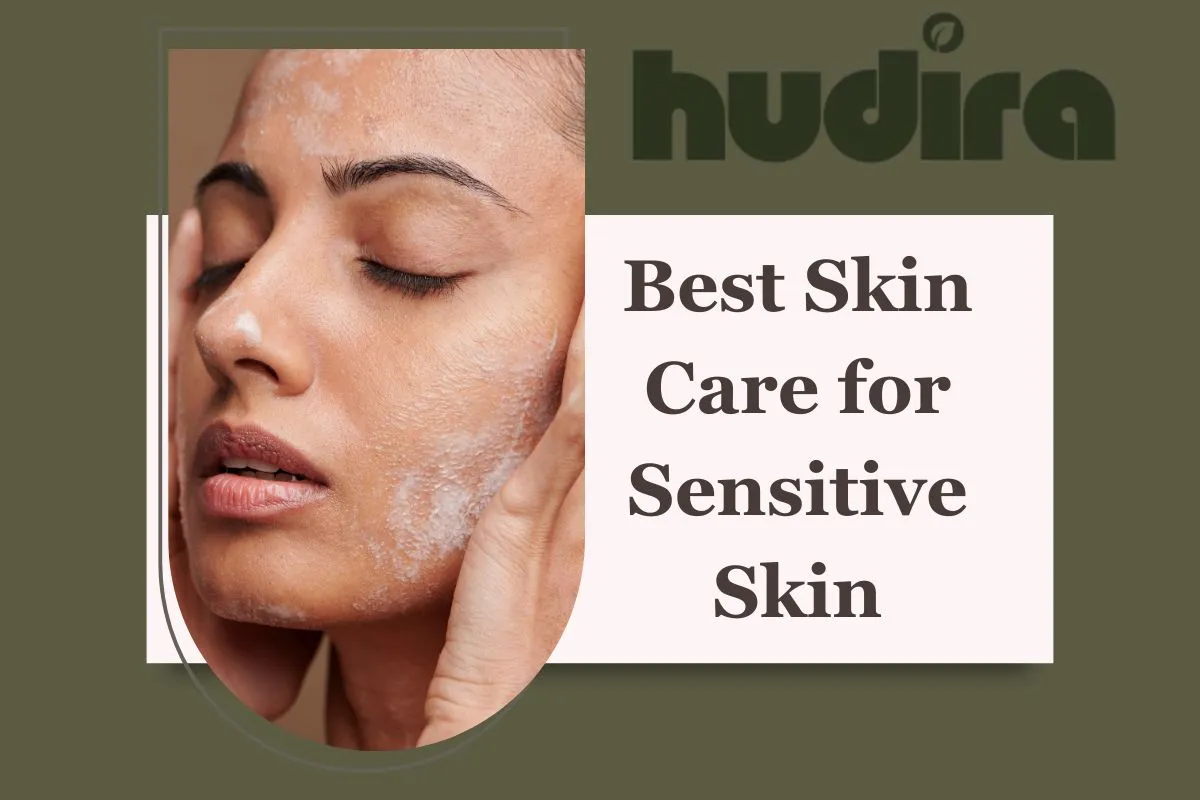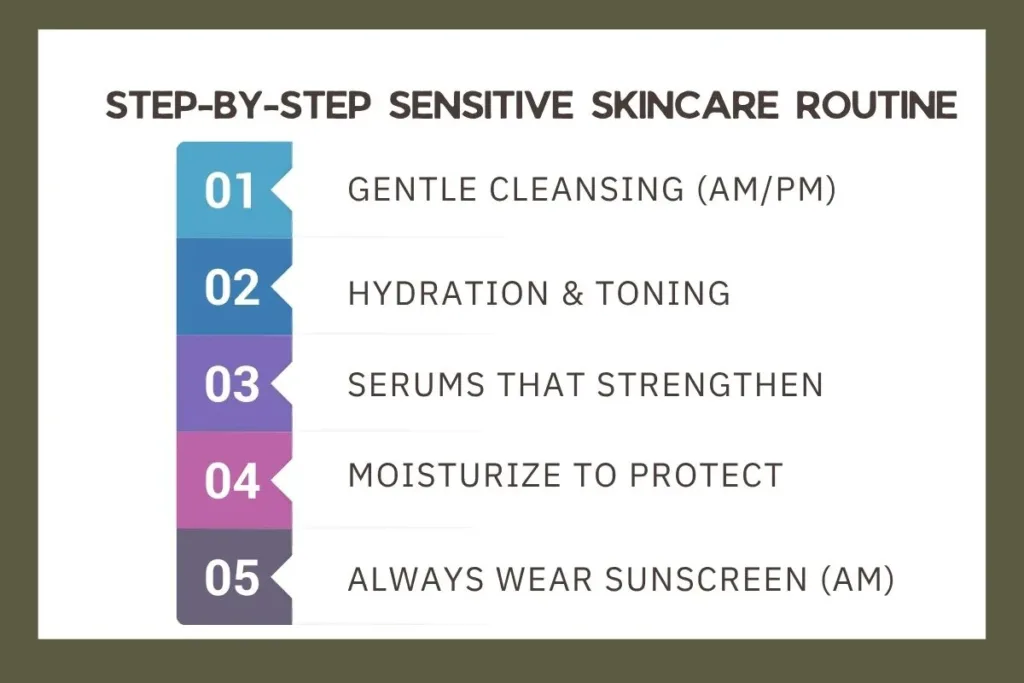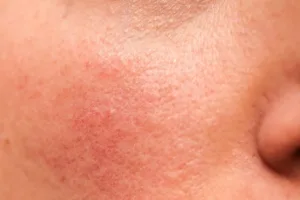No products in the cart.

Is your skin always reacting turning red, itching, or stinging at the slightest change in weather or product? You’re not alone. Sensitive skin affects millions, often making even the simplest sensitive skin care steps feel like a risky experiment. But here’s the truth: with the right sensitive skin care approach, you can transform your routine into a soothing, protective ritual that restores your skin’s natural strength and glow.
What if the secret to comfort and confidence isn’t in dozens of products but in a few mindful, barrier-friendly steps? In this guide, we’ll uncover the best skin care for sensitive skin, revealing what works and what doesn’t for redness-prone, reactive complexions. Whether you’re navigating seasonal flare-ups or daily irritation, this sensitive skincare routine will guide you toward calmer, happier skin. Ready to simplify your routine and start loving your skin again? Let’s begin.
What Is Sensitive Skin?
Sensitive skin refers to a skin condition where your skin has a lower tolerance threshold to environmental factors, personal care products, or internal triggers like stress or hormonal fluctuations. While not classified as a medical diagnosis, it’s a widely recognized and increasingly common concern especially among individuals with a compromised skin barrier or underlying conditions like eczema, rosacea, or allergies.
Common Symptoms of Sensitive Skin:
- Redness or flushing: Skin may appear inflamed or blotchy, particularly after cleansing or sun exposure.
- Tightness or burning: A sensation of discomfort even without visible irritation especially after washing or applying new products.
- Dry patches and flakiness: Skin may feel rough, dehydrated, or peel in certain areas, even after moisturizing.
- Itchiness or tingling: The skin may react with itching or prickling when exposed to heat, wind, or active sensitive skin care ingredients.
- Breakouts or bumps: Sensitive skin often mimics acne-prone skin, reacting to harsh ingredients or occlusive formulas.
In surveys, over 60% of women and 50% of men report experiencing sensitive skin symptoms at some point in their lives.
Why Sensitivity Happens: Understanding the Root Cause
Sensitive skin is often the result of a weakened skin barrier, the outermost layer responsible for keeping moisture in and irritants out. When this barrier is compromised, skin becomes more vulnerable to:
- Harsh skincare ingredients (e.g., synthetic fragrance, alcohol, sulfates)
- Environmental stressors (e.g., UV rays, pollution, dry or cold climates)
- Over-cleansing or over-exfoliating (which strips natural oils)
- Lifestyle factors (e.g., poor sleep, high stress, unbalanced diet)
Knowing your personal triggers is essential. Some individuals may only react to certain preservatives or specific sensitive skin care actives, while others may flare up during seasonal changes or times of high stress.
Sensitive vs. Sensitized Skin: Know the Difference
While often used interchangeably, sensitive skin is usually genetic and ongoing, whereas sensitized skin is triggered by external factors like overuse of exfoliants, environmental aggressors, or stress. Sensitized skin is reversible with proper care, making a gentle, restorative sensitive skin care approach crucial for both.
Step-by-Step Sensitive Skincare Routine

1. Gentle Cleansing (AM/PM)
Use a fragrance-free, sulfate-free gentle cleanser. Cleansing helps remove dirt and pollutants without stripping your skin’s natural barrier. Avoid foaming cleansers with SLS. Opt for milky, gel-based, or balm cleansers with calming agents like oat or chamomile.
2. Hydration & Toning
A hydrating toner or essence can prep the skin and calm inflammation. Look for ingredients like:
- Aloe vera
- Cucumber extract
- Glycerin
- Rose water (if tolerated)
Avoid alcohol-based toners. Always patch-test when trying something new.
3. Serums That Strengthen
Sensitive skin benefits most from minimalist serums that restore barrier function:
- Niacinamide (5% or less)
- Centella Asiatica
- Hyaluronic acid
- Vitamin B5 (panthenol)
These ingredients calm inflammation and lock in hydration without triggering flare-ups.
4. Moisturize to Protect
A fragrance-free moisturizer rich in ceramides, squalane, or shea butter seals in hydration and supports skin recovery. Consistent moisturization is essential for effective skin treatment for sensitive skin.
5. Always Wear Sunscreen (AM)
Sun exposure is a major trigger for sensitive skin. Choose:
- Mineral sunscreens (zinc oxide, titanium dioxide)
- SPF 30 or higher
- No alcohol, fragrance, or drying agents
Mineral SPF is considered the best skin care product for sensitive skin when it comes to UV protection.
Ingredients to Embrace
Ceramides: Strengthen the Skin Barrier
Ceramides are lipid molecules naturally found in the outer layers of the skin, acting as the “mortar” that holds your skin cells the “bricks” together. In individuals with sensitive skin, ceramide levels are often depleted, which weakens the skin barrier and makes it more vulnerable to moisture loss, allergens, and irritants. By replenishing ceramides through skincare products, you restore the skin’s ability to retain hydration and shield itself from environmental aggressors. This leads to a noticeable reduction in dryness, redness, and irritation. Products enriched with ceramides are ideal in any sensitive skincare routine as they reinforce the skin’s structure and offer long-term relief from reactivity. Dermatologists often recommend ceramide-based moisturizers as a foundational step in the best skincare routine for sensitive skin because of their proven ability to repair and fortify.
Aloe Vera & Chamomile: Soothe and Cool Irritation
Aloe vera and chamomile are two of the most trusted botanical ingredients in the realm of sensitive skin care, widely known for their soothing and anti-inflammatory properties. Aloe vera contains polysaccharides and antioxidants like vitamins A, C, and E that help calm burning, redness, and microtears caused by irritation or inflammation. It acts like a hydrating shield, cooling the skin on contact while encouraging healing. Chamomile, on the other hand, is rich in apigenin and bisabolol, powerful plant compounds that reduce redness, combat free radicals, and suppress histamine responses that cause itchiness and swelling. These two ingredients work synergistically to provide fast, visible relief from sensitivity symptoms. Whether used in toners, serums, or face masks, aloe and chamomile are excellent choices when formulating the best skin care products for sensitive skin due to their gentleness and effectiveness.
Colloidal Oatmeal: Anti-inflammatory and Calming
Colloidal oatmeal is a finely ground oat powder that, when suspended in a liquid, creates a soothing, protective barrier over the skin. It is a clinically approved skin protectant and is especially beneficial for those with conditions like eczema, dermatitis, or general skin sensitivity. The key compounds in colloidal oatmeal beta-glucans and avenanthramides possess potent anti-inflammatory and antioxidant effects. These help reduce itching, calm flare-ups, and prevent further irritation by neutralizing the free radicals that contribute to skin damage. Colloidal oatmeal also acts as a humectant, drawing moisture into the skin and locking it in for lasting hydration. Its natural pH-balancing properties make it a gentle yet powerful addition to your skincare routine for sensitive skin, especially in creams, lotions, and masks formulated for daily use.
Prebiotics: Balance Your Skin’s Microbiome
Prebiotics are non-living, plant-derived compounds that serve as nourishment for the beneficial bacteria living on your skin collectively known as the skin microbiome. A balanced microbiome plays a vital role in immune defense, inflammation control, and overall skin health. When sensitive skin becomes compromised due to harsh products, environmental toxins, or over-cleansing the microbiome suffers, allowing bad bacteria to overpopulate and trigger irritation or breakouts. Prebiotics help restore balance by feeding the good bacteria, allowing them to flourish and naturally defend the skin from pathogens and sensitivity flare-ups. Regular use of prebiotic-enriched skincare has been shown to reduce inflammation, restore comfort, and build long-term resilience. Ideal in serums, mists, and light moisturizers, prebiotics are increasingly featured in the best skin care for sensitive skin because they strengthen the skin from within on a microscopic level.
Ingredients to Avoid

Synthetic Fragrances: Hidden Irritants That Linger
Fragrance is one of the most common irritants found in skincare and cosmetic products, and it poses a significant risk for individuals with sensitive skin. Even when labeled as “natural” or “unscented,” many products still contain synthetic fragrance compounds to mask odors. These compounds can trigger allergic reactions, redness, stinging, and inflammation especially on compromised or reactive skin. Because manufacturers are not required to disclose the exact chemicals under the umbrella term “fragrance,” sensitive skin users are exposed to a mix of unknown ingredients, many of which are known allergens or hormone disruptors. To maintain a healthy and balanced sensitive skincare routine, always choose products explicitly labeled “fragrance-free” rather than just “unscented,” and prioritize brands like Hudira that commit to transparency and gentle formulations.
Essential Oils: Natural but Not Always Gentle
While essential oils are praised for their natural origins and therapeutic benefits, they can be surprisingly harsh for sensitive skin, especially when used undiluted or in high concentrations. Oils like peppermint, tea tree, citrus, or lavender may smell calming, but they contain volatile compounds that can disrupt the skin barrier, cause contact dermatitis, and even lead to photosensitivity. For people with sensitive skin care concerns, these oils may provoke more harm than healing. Even diluted essential oils can be reactive on already inflamed or damaged skin. Unless recommended by a dermatologist or formulated by a trusted sensitive-skin brand using low, safe concentrations, it’s best to avoid essential oils altogether and opt for botanical extracts or hydrosols that are far more skin-friendly.
Alcohol (Denatured or SD): The Drying Culprit
Alcohol in skincare, especially denatured alcohol (alcohol denat.) or SD alcohol is often used to create a fast-drying, lightweight texture. However, for sensitive skin, this ingredient can be extremely disruptive. It strips away the skin’s natural oils, damages the lipid barrier, and leaves the skin more prone to dryness, irritation, and inflammation. The more the skin barrier is compromised, the more reactive and fragile it becomes leading to a vicious cycle of sensitivity. Although not all alcohols are bad (some fatty alcohols like cetyl or stearyl alcohol are hydrating), denatured and SD alcohols should be avoided in any skincare routine for sensitive skin. Always scan the ingredient label and choose alcohol-free formulas to maintain the skin’s natural moisture balance.
Retinoids: Potent Actives That Require Caution
Retinoids are powerful derivatives of vitamin A, widely used in sensitive skin care to treat acne and signs of aging. However, they are highly potent and commonly associated with irritation, peeling, redness, and sensitivity especially in new users or those with naturally reactive skin. For individuals focusing on sensitive skin care, retinoids should be approached with caution and only used under dermatologist supervision. While some low-strength, encapsulated retinols may be tolerable over time, it’s best to begin with soothing alternatives like bakuchiol (a plant-based retinol alternative) or vitamin C derivatives that offer similar benefits with a gentler profile. Hudira, for instance, emphasizes gentle botanicals and antioxidant-rich ingredients that support your skin’s health without the harsh side effects of conventional actives.
Harsh Exfoliants: Overdoing It Can Break Your Barrier
Physical scrubs with coarse granules (like walnut shells or apricot kernels) and high-percentage chemical exfoliants (like AHAs or BHAs) can cause micro-tears or chemical burns especially when used frequently or without adequate buffering. Sensitive skin thrives with gentle, low-intensity exfoliation, ideally once a week with products that include enzymes (like papaya or pumpkin) or soft powders like rice flour. Over-exfoliating leads to barrier breakdown, increased water loss, and exposure to irritants, which worsens skin treatment for sensitive skin. If exfoliation is needed, always opt for formulations designed specifically for sensitive skin and follow up with hydrating, barrier-repairing ingredients like ceramides and aloe vera.
Nighttime Sensitive Skin care Routine for Sensitive Skin
Your skin repairs overnight. Use this time for recovery:
- Cleanse gently
- Apply a hydrating serum (hyaluronic acid + panthenol)
- Seal with a moisturizer or facial oil (like jojoba or rosehip)
- Avoid actives unless prescribed
Night is also ideal for applying soothing skin treatment for sensitive skin like hydrating masks or barrier creams.
Best Skin Care Products for Sensitive Skin – What to Look For
- Hypoallergenic & Dermatologist-Tested
- Short, minimal ingredient list
- Fragrance-free, alcohol-free
- pH-balanced (~5.5)
At Hudira, all our products are thoughtfully designed with these standards to offer the best skin care for sensitive skin naturally and gently.
Lifestyle Tips That Support Sensitive Skin
- Use lukewarm water (not hot)
- Avoid over-washing or over-exfoliating
- Sleep on clean, soft pillowcases
- Stay hydrated and eat antioxidant-rich foods
- Manage stress through gentle movement, sleep, or mindfulness
Why Hudira Is Ideal for Sensitive Skin
At Hudira, we believe sensitive skin deserves special care rooted in nature. Our formulations avoid harsh chemicals and embrace botanical calmers like turmeric, rose water, neem, and aloe vera. Our mission is to restore your skin’s peace while honoring its natural strength.
Call-to-Action
Ready to give your skin the gentle care it deserves? Browse Hudira’s naturally soothing skincare collection designed for sensitive skin care that heals, hydrates, and protects—without compromise.
Shop our Sensitive Skin Essentials
FAQs
Q. Can I exfoliate if I have sensitive skin?
Yes, opt for very gentle exfoliants like rice powder or enzyme-based products 1x a week.
Q. Is rose water safe for sensitive skin?
It often is, but always patch-test.
Q. What causes sensitive skin to flare up?
Common causes include harsh products, stress, hormonal changes, weather, and UV exposure.
Q. Can I wear makeup with sensitive skin?
Yes, choose non-comedogenic, fragrance-free formulas and double cleanse at night.
Q. Are natural products better for sensitive skin?
Often yes, if they’re free from essential oils and processed gently, like Hudira’s skincare line.



Add comment